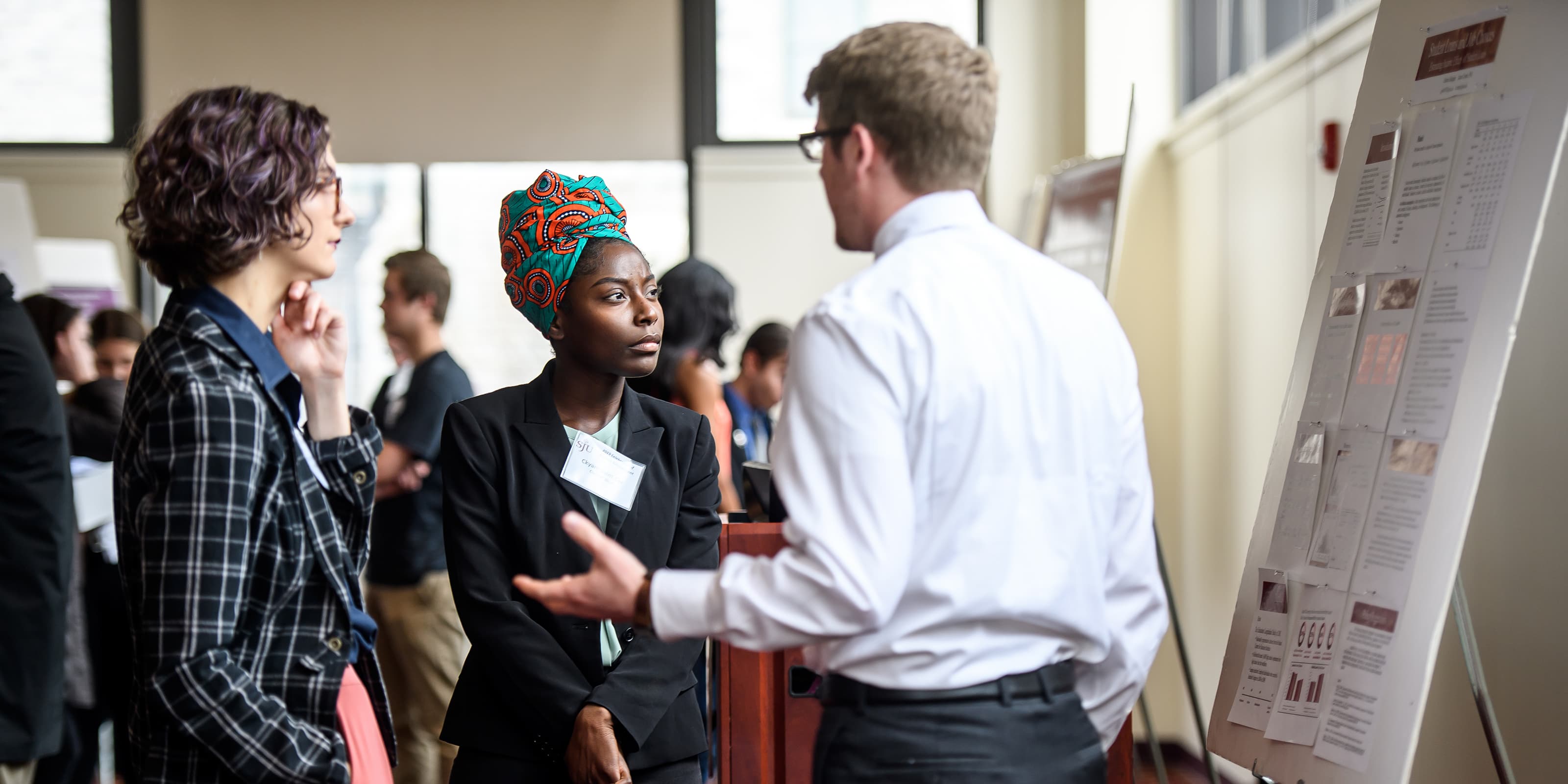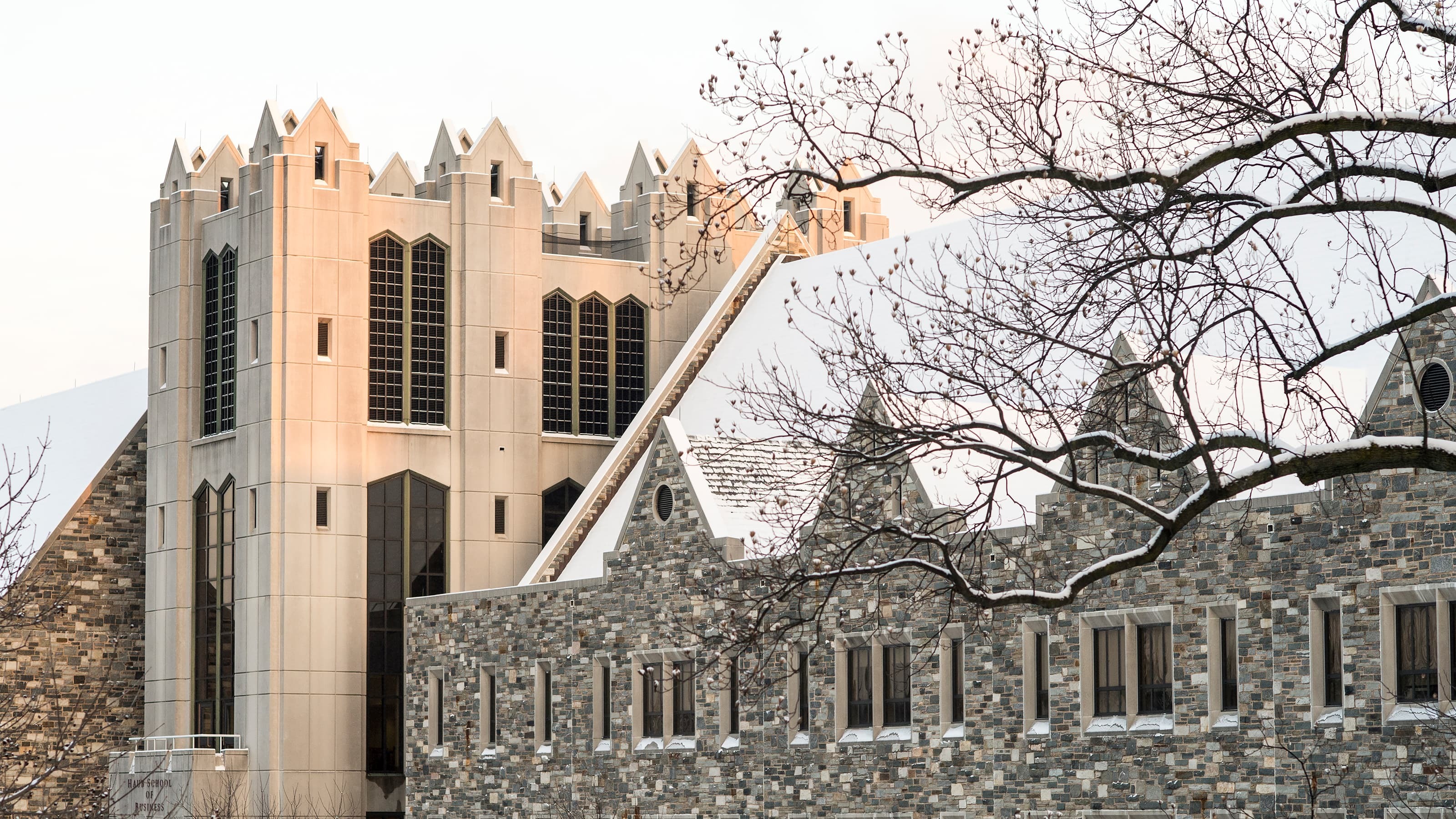Summer Scholars Projects Make an Urban Impact
Three students participating in the Summer Scholars research program spent their summers studying how to improve food security and education in Philadelphia.

KEYS TO THE ARTICLE
- Saint Joseph’s University’s Summer Scholars Program allows currently enrolled students the opportunity to participate in faculty-mentored research over the summer.
- Three Summer Scholars projects impact and shed light on issues facing communities in Philadelphia.
- Food insecurity, bilingual education and writing tutors are areas being researched by St. Joe’s faculty and staff, with a focus specifically on Philadelphia.
As the economy has improved since the Great Recession, food insecurity has declined in the rest of the country. But not in Philadelphia.
“Philadelphia is the poorest of the top 10 biggest cities in the United States,” says Keith Brown, Ph.D., an associate professor of sociology. “We have a robust anti-hunger community, yet food insecurity has remained the same here. Why is that?” Brown recruited one of his students, Juliana Magriples ’22, a sociology major, to help him study the issue as part of Saint Joseph’s Summer Scholars Program.
Summer Scholars allows currently enrolled students to participate in faculty-mentored research over the summer. The aim of the program is to provide students with the opportunity to participate in research with a faculty member to foster a close professional mentorship. It also allows students the opportunity to publicly share and present the results of their work.
Brown and Magriples’ project is just one of a few 2020 Summer Scholars projects that had a focus on research and helping the local Philadelphia community. Brown worked with a local cooperative grocery store to try to figure out the barriers to eating healthy for low-income residents in Philadelphia. “We interviewed 37 Supplemental Nutrition Assistance Program (SNAP) recipients, and accompanied them on a typical grocery shopping trip,” Brown explains.
For her Summer Scholars project, Magriples is studying the data that has been collected from these trips and interviews, looking for patterns. “She has learned how people view themselves as distinct from others,” Brown says. “The data shows that people feel going to food banks or soup kitchens is beneath them; but then when they go, they feel unworthy. When they use SNAP dollars, they feel that they’re still in control. They feel worthy, like a citizen. Their ideals are typical of the middle class: hard work and individualism. They take pride in those values.”
Bilingual Education vs. ESL
Eileen Burner ’21 is another Summer Scholar whose research is focused on Philadelphia. As a double major in secondary education and French, Burner was required to take English as a Second Language (ESL) classes, where she also learned about bilingual education models. “It was always pushed that bilingual education was the best practice – better than the typical ESL model,” she says. “But I went to high school in this area, and I know people who went to high school in Philadelphia, and we never saw that best-practice model in use around here. I wondered why? What models were used instead?”
She explains that in most schools with ESL models, students are pulled out of regular classes and put into ESL classes, so they don’t get as much content material covered as their English-speaking classmates. “Many times, ESL pushes students to learn English and nothing else,” Burner explains. “Often, students feel like everything they’ve been taught to that point is a waste, and they’d need to learn English to succeed.” Burner’s faculty mentor for her project was Kristin Burr, Ph.D., professor of languages and linguistics.
“As the economy has improved since the Great Recession, food insecurity has declined in the rest of the country. But not in Philly, where we have a robust anti-hunger community. Why is that?”
Keith Brown, Ph.D.
Associate Professor of SociologyWith the bilingual education model, students are encouraged to develop their home language, as well as English. Burner learned, through her research during the Summer Scholars program last year, that the more a school valued the home culture and language in their programs, the better the students did. “The idea that you’re not just reading American and British literature, but also literature from different cultures, makes students feel more valued,” Burner says.
Last year, Burner’s Summer Scholar project included interviewing teachers and local bilingual program directors to see what models were used. COVID-19 prevented Burner from interviewing students in schools this year, so she interviewed people from the Pennsylvania Department of Education who worked in the bilingual section. “I wanted to know how these legislators have seen the models change since they’ve been here.” She also interviewed friends she had made during her time studying abroad. “Some of my friends learned English in a different country. I wanted to see how their bilingual models compared to those here.”
She learned that the focal bilingual model was best, but not always possible, especially in schools where up to 40 different languages are spoken, and not enough qualified teachers were available. But Burner is not deterred. “I would love to teach ESL,” she says. “And I would try to get my classes as close as I could to the bilingual model. It would be great to work at a school with a full bilingual program.”
Creating a Community Partnership for Writing Services
Gabriella Bamford ’22 is also doing a Summer Scholars project with a focus on Philadelphia area high school students.
“I’m a double major in English and communications,” she says. “So I am very passionate about people learning to write well.” Under the mentorship of Jenny Spinner Ph.D., an English professor, and director of the Writing Center at St. Joe’s, Bamford is focusing her project on using the St. Joe’s Writing Center to benefit underprivileged high schoolers by helping them improve their writing skills, particularly when it comes to writing college admissions essays.
“When I was a senior in high school, I came to an open house at St. Joe’s where I worked one-on-one with a Writing Center tutor on my admissions essay,” Bamford says. “It was a great resource that helped me focus and find a clear direction. I also understand that I went to a well-funded public high school that had counselors who specifically helped us with college applications. I had the resources I needed.” Bamford notes that the numbers of students in inner city schools who go to college are significantly less than students in suburban schools, and that many Philadelphia high schools don’t have the funding for college and essay tutors.
“As writing tutors, we’re trained to do the same college writing as admissions tutors do,” Bamford says. “So why not take our services out into the community?”
“The Writing Center at St. Joe’s has long been interested in community partnerships,” Spinner adds.
Bamford has spent the summer researching different community writing and engagement centers. COVID-19 has added another layer to her work. “I have also been researching how to be effective online tutors,” she says. She is working with the admission office to structure a plan and set up presentations for high school students who need help with their college essays.
“Once things are solidified with our community partners, this will be a very good and beneficial thing,” Bamford says. “If I can make the college admissions process a little fairer, or give a prospective student a boost of confidence, I think that’s a great way to give back to the community.”



